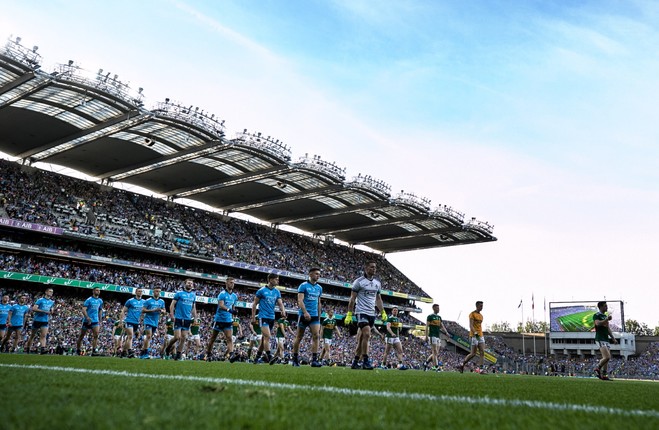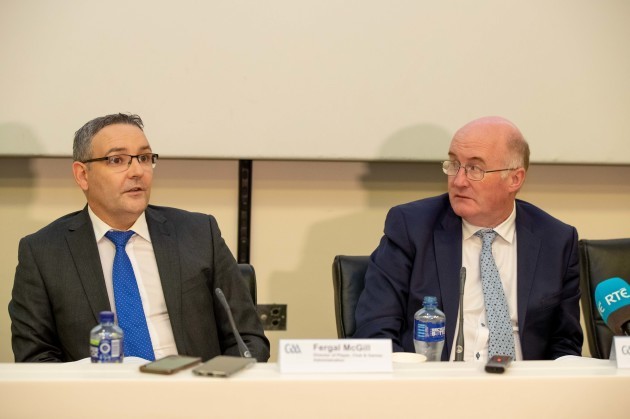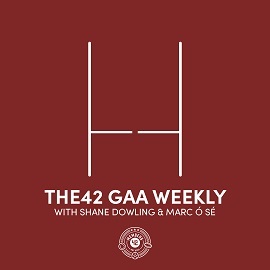A SPLIT GAA season with July All-Ireland finals is coming by 2022, if passed by Congress.
The release of the Fixtures Calendar Review Task Force’s updated report yesterday confirmed that much, as the GAA moves a step closer to introducing a split season between club and county.
The recommendation is that inter-county competitions take place first in the annual calendar, culminating in All-Ireland finals “no later than” mid-July. The focus would then switch to club championship matters.
The scrapping of pre-season competitions has also been proposed, along with the prospect of no inter-county training taking place before 1 January.
Over the coming weeks, county boards will have the chance to offer feedback on this split-season model, before recommendations will be finalised by Central Council in December.
The plan then would be a vote at Congress 2021, with the 2022 season potentially revamped.
Understandably, the possibility of inter-county showpieces taking place in July was a big talking point after the report’s release yesterday.
“That’s the idea of the consultation process, pure and simple, to try and establish is the Association ready for it,” Feargal McGill, the GAA’s director of player, club and games administration, said.
“Our job is to outline the implications of it as best we can and so much of what is in this report and all of the lads who are on the committee would back me up on it, but so much of what is in this report is about choices.
So you can have All-Ireland finals in September if you want but there are certain things you can’t have. This is one of the things. If you want no interference to club fixtures from the inter-county game then this is your way to do it. It’s about choices and what people want, in terms of whether the Association is ready or not, we will find out very shortly.”
“From a promotional context, very simply, you leave half the year or you certainly leave five months of the year without any inter-county competition,” McGill added.
“It is very obvious, you only need look at the last couple of weekends, just what inter-county competitions do in terms of promotion of the association, in terms of putting us front and centre in people’s minds in this country.
“It is simple as that, it means you are ending your inter-county competitions in mid to late July rather than in early September. There are other promotional imperatives for doing it, which is that you potentially give the club better promotion and publicity.”
And he sees no negative financial impact on the move to July:
“You’re going to have the same amount of games, you’re going to have, hopefully, the same amount of attendances so the same amount of games should amount to the same amount of TV money, the same amount of sponsorship money, etc. It may have a slight effect insofar as we won’t be going as deep into the year but I doubt it.”
On the split season in a more general view, McGill explained the reasoning behind the county season potentially taking place first.
He revealed that Croke Park “gave some consideration” towards playing the club season first, and then delved deeper into the decision behind the switch-up, stating the clubs would not have accepted the early finish.
It was quickly obvious it wasn’t going to work, doing it the other way around. Just, I think clubs would have had it difficult to accept having to play county finals at the end of April, beginning of May, which would have been a necessity if you flipped it and did it the other way around. I think that was probably the main concern.
“It also didn’t necessarily deal with the issue of club and county crossing over. It’s a lot easier in terms of crossover and counties looking for players’ time if you flip it to where it is at the moment. It’s a lot easier for problems to arise.
“The third reason was that whole piece when a club’s flagship team goes out of the championship, it is very, very difficult to get a team involved in league competitions, cup competitions or anything non-championship.
“Once the flagship team goes out of the championship, the thing dies that is just the reality of it. You do have that enthusiasm among club players to play league competitions in April, May, June ahead of the club championship, you would the other way round.”
McGill also touched on how the Covid-19 crisis and the resultant season format has changed attitudes in terms of inter-county training and the need for “downtime” for volunteers across the board.
Hopefully we have been through a positive process with that and hopefully that will carry on through,” he said.
And on the plans to retain the provincial championships in any new inter-county football format, McGill concluded: “One of the pieces of feedback we got was that the provincial championships should be retained if possible.
“Look the thing can stand or fall without them, without the provincial competitions in that particular proposal. It was felt it was a better way to go by the committee to keep them included, as simple as that.”
Subscribe to The42′s new member-led GAA Championship show with Marc Ó Sé and Shane Dowling.



